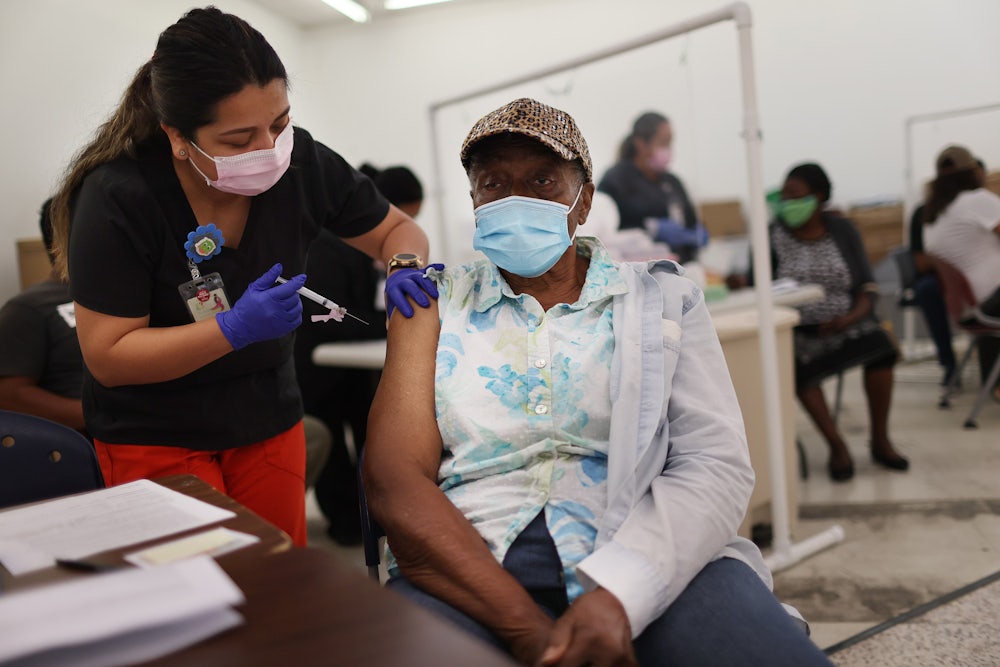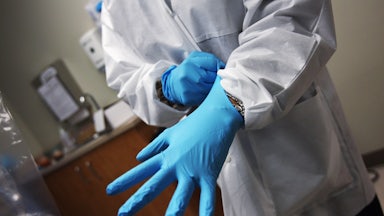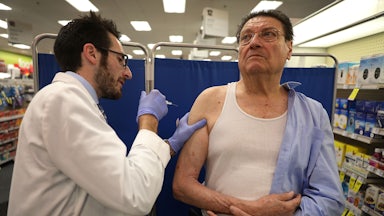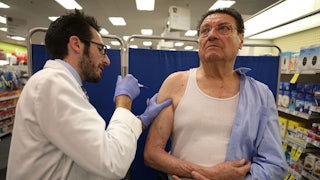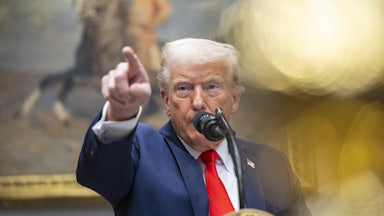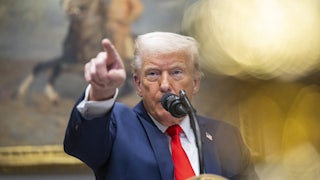Several months into the largest mass vaccination campaign in U.S. history, nearly half the country’s residents have yet to get a shot. While pollsters and journalists have strained to sort that cohort into subgroups, based loosely on varying degrees of persuadability—anti-vax diehards slotted into one box; patients concerned about deaths linked to the Johnson & Johnson formula slotted into another—a somewhat unexpected obstacle has emerged that deserves attention. Though Congress passed legislation mandating that Covid-19 vaccines be free at the point of use for all U.S. residents, around one-third of unvaccinated people cited fear of cost as a significant reason they’ve yet to get the jab. Even worse, it’s a barrier for people who seem to genuinely want it: a full 45 percent of those stipulating that they hope to get it “as soon as possible,” compared to only 19 percent of those resolutely opposed.
Per a follow-up report in The New York Times, this phenomenon isn’t solely ascribable to ignorance about the mandate against cost-sharing. Apparently, many people do know that the jabs are supposed to be free. They just don’t believe it. As one still unvaccinated 42-year-old put it, “This is America—your health care is not free.… I just feel like that is how the vaccination process is going to go. They’re going to try to capitalize on it.”
You can’t exactly blame her for believing this to be true. As it happens, patients across the country have been slapped with coronavirus-related medical bills throughout the pandemic, sometimes getting hit with steep charges for testing and treatment in spite of Congress’s mandates. And even though restrictions on billing patients were tightened even further for the rollout of vaccinations, anecdotal reports of patients receiving bills for their shots are common enough that the Department of Health and Human Services has publicly asked to be notified of violations. Even if such events are rare, the startlingly widespread concern about it poses an undeniable threat to public health—and is just the latest illustration of the havoc wrought by a health care system that millions of people are too terrified to use.
The widespread fear of staggeringly high costs has a dramatic impact on practically every facet of the health care system, even after the implementation of the so-called Affordable Care Act. Nearly 10 percent of Americans remain uninsured, nearly three-fourths of whom cite cost as the reason why. One in three people report skipping care due to financial concerns, and two-thirds say they couldn’t afford a bill over $1,000.
The threat of losing health insurance—and presumed subsequent exposure to pricy COBRA premiums or out-of-pocket payments—keeps one in every six workers tethered to a job they’d otherwise leave. Co-pays and deductibles push patients away from getting vital care and have been linked to delayed treatment for breast cancer. Forty-one percent of nonelderly adults have reported struggling with medical bills or debt, and around half of medical debt-holders default. Unpaid medical bills can tank credit reports, funnel patients into collections, or pit them against hospitals in court. Medical debt is among the leading drivers of personal bankruptcy and other long-term detriments to a patient’s financial and emotional stability for years after it’s incurred.
Some such bills—like those that were erroneously issued for Covid-19 vaccines—can perhaps be written down to clerical errors or other such mistakes. But even in these instances, patients must shepherd themselves through the labyrinthine customer service processes of their provider, insurer, or both in order to rectify the situation. (A point at which many people, caught in the confusing warren of health care administration, will simply surrender their money just to escape, which surely nets the health care industry not insignificant piles of cash in aggregate.)
At least some portion of unpaid medical debt almost certainly falls into the category dubbed “surprise medical bills,” defined as out-of-network care at in-network facilities that was significantly curtailed by legislation passed late last year. But if understood more colloquially, there are still countless ways to rack up “surprise medical bills” as an American patient: You can have a medical emergency out of state, misread fine print, botch a premium or enrollment deadline, take a ride in an ambulance, get confused about provider networks, require particular care from a specialist, have a coverage gap between jobs, bungle some prior authorization rule, fail to tack a partner or baby onto your plan, or a bajillion other reasons.
I’ve heard countless stories of sticker-shock-inducing, life-altering health care bills, and often it’s difficult to discern exactly what went wrong and why. Health care journalists spend entire careers delving into the specifics of singularly egregious individual incidents; the best-known in the field are the ones with a track record of getting providers and insurers to cancel outrageous charges. But when you zoom out from the health care billing misadventures that make headlines, the larger scene feels much more random: For patients lucky enough to be insured, sometimes care comes through the way it’s supposed to. And sometimes it doesn’t.
Soul-crushing financial calamity is so endemic to our system that it’s tough to imagine someone who hasn’t heard firsthand accounts of livelihoods wrecked by the uniquely commodified experience of U.S. health care. With such a wide spectrum of possible doomsday scenarios, the efficacy of targeted policy tweaks is inherently limited. And if an understandable lack of trust in a system that fleeces so many has managed to blunt the mandate requiring free Covid-19 vaccines, the potential of less ironclad measures to transform the patient experience meaningfully is even weaker.
According to one recent analysis, millions of currently uninsured people are eligible for either Medicaid or federal subsidies to buy insurance plans on the ACA exchanges—whether they don’t make use of this money because they don’t know about the benefit or have knowledge of the available subsidies and simply maintain an understandable skepticism about them is anyone’s guess. Nevertheless, it’s disingenuous to contend—as Vox recently has—that zero-premium ACA plans are “free.” Co-pays, deductibles, and the aforementioned list of endless ways to trigger costs render such claims dishonest. Maybe it will be free! But the more care a person requires, the greater the chance that it won’t be.
The only way fully to avoid financial fallout is to stay away from the health care system altogether—a truism untold numbers of patients surely internalized long before Covid-19 came along. That fear has repelled people from seeking insurance and care for years, as evidenced by persistently sluggish coverage numbers over a decade after the system’s storied Obama-era overhaul. That effectively means that millions of patients have no relationship with health care institutions or providers at all—and that’s a problem that even free vaccination can’t overcome.
